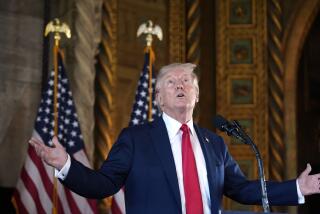Perot Is Electable, Brown Says; He’s Silent on Clinton : Politics: The former governor contends that the emergence of the Texan is an indictment of the two major parties.
- Share via
ALBUQUERQUE — Democratic presidential candidate Edmund G. (Jerry) Brown Jr. says it’s conceivable that Texas billionaire Ross Perot could be elected President in November but declines to say the same of his own party’s presumptive nominee, Arkansas Gov. Bill Clinton.
After temporarily restraining his rhetoric, Brown has taken to blasting Clinton again in recent days and shows no inclination to close ranks as the June 2 California primary approaches and the nominating process winds down. He went so far as to attack Clinton for accepting Secret Service protection “to pump him up as some sort of putative President.”
Brown describes Perot’s emergence as vindication of his contention that Clinton is not electable. In an interview, Brown said it is conceivable that Perot could become President, especially if “a certain amount of endorsements come his way from credible people.” Asked whether it is also conceivable that Clinton could win in November, Brown replied: “I don’t want to speculate.”
Even with the scant national media coverage Brown is getting these days, his ongoing assault on the party’s presumed nominee is certain to further antagonize party leaders. But the man best known in some circles as “Gov. Moonbeam” seems to have crossed the Rubicon some time ago.
On Wednesday, he conceded that the party hierarchy is jumping on Clinton’s bandwagon. “But a lot of smart people jumped on the Titanic ship and it still sunk,” he told the annual convention of Image, one of the largest Latino organizations in the country.
Earlier, asked whether his continued candidacy is harming the Democratic Party, Brown replied, “Where is the Democratic Party? It’s very hard to find the Democratic Party. It’s something that needs to be reinvigorated.”
Whether or not Brown eventually endorses Clinton, the former California governor appears motivated now, in no small measure, by a desire to pursue the White House again in 1996--building on the fund-raising base, experience and supporters he has generated nationwide in the last six months.
“What you have to do is go all over the country for four years and build a movement without declaring” for President, Brown told reporters Wednesday. “You have to take over the party.”
Brown, 54, has said that he aspires to create such a grass-roots effort. He has already sought the presidency three times--once in each of the last three decades--and does not rule out another try.
En route to tour the Sandia National Laboratory, meet with representatives of 19 Indian pueblos and address the Latino convention in anticipation of New Mexico’s June 2 primary, Brown looked back as well as ahead.
He said he should have run for President four years ago and made a mistake by becoming California Democratic chairman in 1989 after he returned from a seven-year political sabbatical.
“I should not have run for party chairman,” Brown said. “That tied me too closely to the party, and it got in the way of my message” that the political parties are primarily responsive only to their big donors.
But Brown was upbeat and outgoing after his latest decisive primary losses Tuesday. He called the 35% of the vote that he won in Oregon--compared to 50% for Clinton--”a very powerful constituency.” He also took 29% in Washington state to Clinton’s 51%.
In contrast to his customary stiffness, Brown hobnobbed with startled passengers in airports and on commercial flights, shaking hands, posing for photos and signing autographs.
At each stop on his low-budget, loosely run campaign these days, Brown is queried about Perot, who is expected to declare his candidacy next month.
In Little Rock, Ark., Brown was asked whether he would consider voting for Perot. “That’s nonsense,” he replied curtly.
In Cleveland Brown was asked whether he would consider becoming Perot’s running mate. “Let’s not get into hypotheticals,” he said--but he did not say no.
Brown’s responses reflect his ambivalence about Perot, who he has known casually for some years. Brown says he is drawn to Perot’s emphasis on domestic concerns as well as his assault on the political Establishment.
“He’s not a Republican, he’s not a Democrat. That’s his greatest strength,” Brown said at one point. “He has an aura of not being part of the club in Washington.”
At the same time, Brown says that the notion of Perot spending $100 million or more of his own money to get elected is antithetical to his own commitment to grass-roots campaigning. Brown has funded his entire candidacy through his now-famous 800 number and about 100,000 contributions of no more than $100 each. The legal limit for candidates who get federal matching funds is $1,000.
“He’s got a billion dollars worth of credibility,” Brown said. “If someone can control an election--rocket right to the top with his own money--it does call into question the whole concept of popular democracy.”
Brown maintained that it did not gall him to see his insurgent mantle pass to a man who’s never served in public office or put in a single grueling 15-hour campaign day. He said that many of his supporters are moving to Perot.
Rather, Brown has called Perot’s meteoric rise an indictment of political parties that produce presidential nominees who inspire so little loyalty that an outsider can stir so much interest.
“Because candidates are not representing identifiable constituencies with clear agendas that are really intended to be implemented and will make an impact, our politics has degenerated into gesture, photo opportunity and ambiguous utterances and images that people know are meaningless,” Brown said. “Therefore, people are looking for a man on a white horse.”
More to Read
Get the L.A. Times Politics newsletter
Deeply reported insights into legislation, politics and policy from Sacramento, Washington and beyond. In your inbox twice per week.
You may occasionally receive promotional content from the Los Angeles Times.










